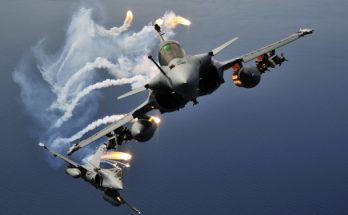Alarmed by Russia’s invasion of Ukraine, normally EU-skeptic Denmark has voted to scrap the country’s opt-out on the bloc’s common defense policy. The referendum, conducted on June 1, resulted in a 67-33 percent landslide in favor of closer European integration on security and defense following 30 years of remaining on the outside of such decisions.
Though Denmark is a standing member of the European Union and very supportive of the single market and deepened economic cooperation within the bloc, it has generally remained distrustful of enabling greater EU decision-making. Previous referendums regarding keeping Denmark’s opt-outs on the single currency and on justice and home affairs ensured these remain in place.
As for efforts by the EU to build a common security and defense policy, Denmark has until now stood outside the collective ring. After initially rejecting the Maastricht Treaty – intended to build a political and economic foundation for greater EU integration – in 1992, the government negotiated four opt-outs prior to adopting the treaty on the second go-round in May 1993.
Along with the common security and defense policy, Denmark also opted out on the aforementioned justice and home affairs, the common currency, and citizenship. The latter provision – ensuring European citizenship does not replace national citizenship – is no longer an issue, as many other EU members have since adopted a similar position. But successive governments have since attempted and failed to overturn the other opt-outs, with Prime Minister Mette Frederiksen the first to successfully remove one.
The victory owes much more to Russian President Vladimir Putin’s invasion of Ukraine and use of energy supplies as a weapon against Europe than to Frederiksen or her minority government’s dexterous steerage on the issue. The measure had widespread support in Parliament, with only three small parties (two on the right, one on the left) campaigning against it.
Putin’s decision to invade Ukraine has altered attitudes regarding defense and security in European countries normally disinclined to give such matters much thought (and to generally be unfavorable to them when they do).
Seemingly overnight, Finland and Sweden have seen major rethinking with regard to their traditional militarily non-aligned approaches. Both nations have now applied for membership in the NATO Alliance, which – along with Denmark’s scrapping of its EU opt-out on defense and security – would allow for greater cooperation between the Nordic partners.
Combined with the historic decisions of Finland and Sweden to seek Nato membership, Denmark’s vote to scrap its opt-out from the EU’s defence policy completely changes the security situation in the Nordics https://t.co/dAtnFvjU5e
— Financial Times (@FinancialTimes) June 2, 2022
Also of note is that the Frederiksen government and the main parliamentary parties reached an agreement to steadily increase the national defense budget in order to reach the NATO spending target of 2 percent of annual GDP by 2033. While hardly a bold measure – particularly under current circumstances as NATO partners scramble to reinvest in defense, the agreement nonetheless reinforces prior statements of commitment and puts Copenhagen on a well-defined course to raise military expenditures from the current 2022 level of 1 percent of GDP.
Dan Darling is Forecast International’s director of military and defense markets. In this role, Dan oversees a team of analysts tasked with covering everything from budgeting to weapons systems to defense electronics and military aerospace. Additionally, for over 17 years Dan has, at various times, authored the International Military Markets reports for Europe, Eurasia, the Middle East and the Asia-Pacific region.
Dan's work has been cited in Defense News, Real Clear Defense, Asian Military Review, Al Jazeera, and Financial Express, among others, and he has also contributed commentary to The Diplomat, The National Interest and World Politics Review. He has been quoted in Arabian Business, the Financial Times, Flight International, The New York Times, Bloomberg and National Defense Magazine.
In addition, Dan has made guest appearances on the online radio show Midrats and on The Media Line, as well as The Red Line Podcast, plus media appearances on France 24 and World Is One News (WION).




